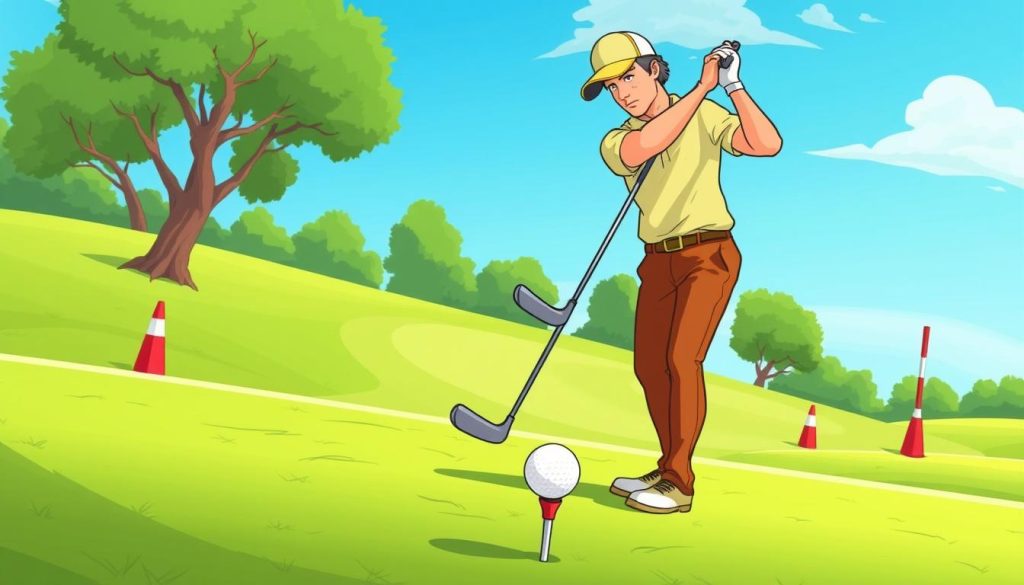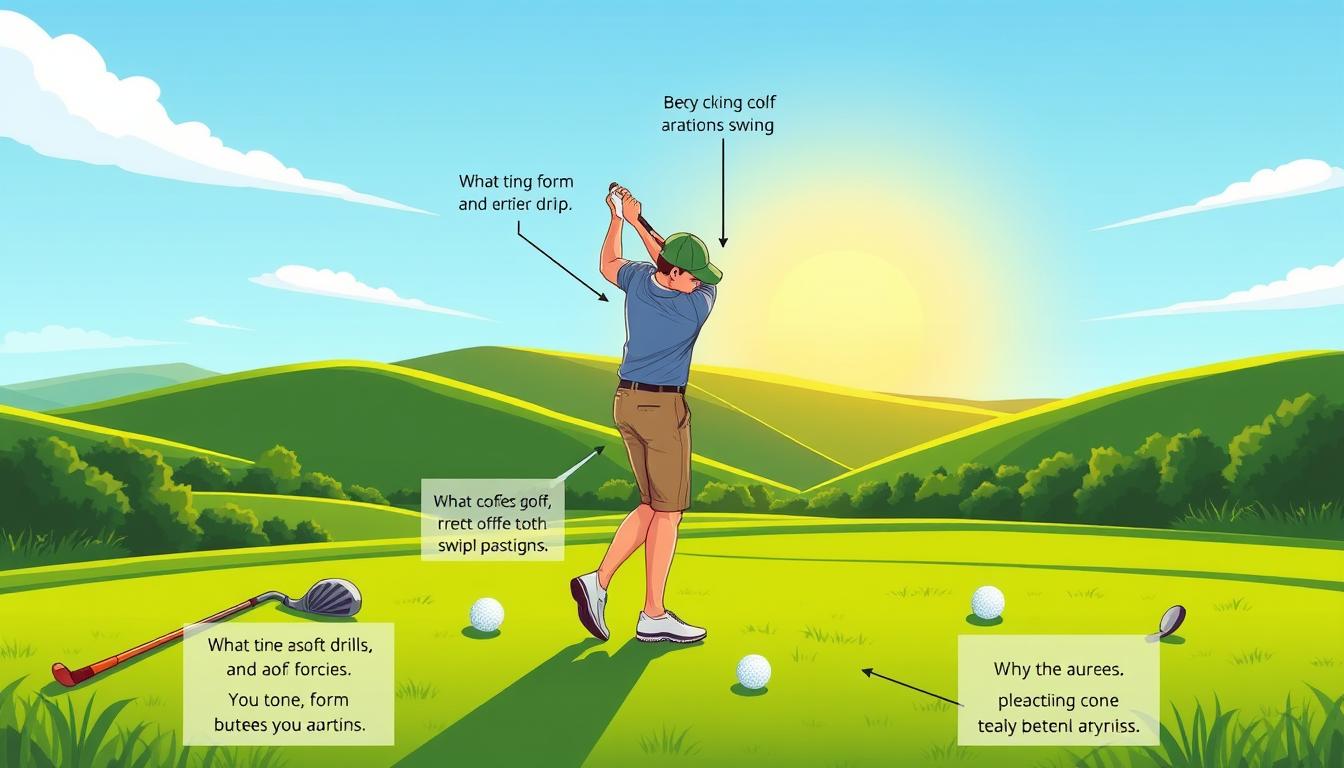Golf swing mechanics are key to a good game. This guide covers essential drills to improve your technique and score. It’s for beginners and experienced players aiming to lower their score. Mastering proper golf swing mechanics requires discipline, practice, and attention to detail. Incorporating targeted golf swing improvement exercises into your routine can help refine your form, enhance consistency, and increase power. From grip adjustments to full-body coordination drills, these exercises are designed to address common swing flaws and elevate your performance on the course.
We’ll explore techniques for putting and iron strikes for all levels. With practice and the right approach, you’ll see big improvements. Let’s start this journey to better golf!
Key Takeaways
- Focus on essential components of golf swing mechanics
- Practice putting skills to improve your short game
- Utilize home practice solutions for consistent improvement
- Implement advanced iron strike training techniques
- Optimize your driver swing for better distance and accuracy
- Incorporate mental game strategies to enhance overall performance
Our beginner coaching plan is rated 4.9 out of 5 from 1489 reviews and costs $99.00 USD. For advanced instruction, our All Levels plans are rated 4.7 out of 5 by 35 customers. They cost between $99.00 and $149.00 USD. These programs offer tailored guidance for mastering the 10 effective golf drills in this guide.
Essential Components of Golf Swing Mechanics
Improving your golf game starts with understanding the basics. A good golf swing analysis shows you what makes a shot great. Let’s look at the key parts of a golf swing to improve your technique.
Understanding Proper Wrist Action
The wrists are crucial in golf for controlling the club and power. The right wrist action is a hinge in the backswing and keeping the angle at impact. This helps create lag and boosts clubhead speed.
Mastering Club Face Control
Controlling the clubface is key for accuracy and consistency. Make sure your clubface is square to the target at address. Keep it aligned during the swing for the right ball flight.
Body Rotation Fundamentals
Proper body rotation is essential for power and balance. Start with a balanced stance, then rotate your shoulders and hips in the backswing. On the downswing, start with your lower body, letting your upper body follow.
| Swing Component | Key Point | Common Mistake |
|---|---|---|
| Grip | Overlapping grip most common | Gripping too tightly |
| Stance | Feet shoulder-width apart | Standing too narrow or wide |
| Weight Distribution | Balanced at address | Leaning too far forward or back |
| Backswing | Rotate shoulders and hips | Swaying instead of turning |
| Downswing | Weight transfer to front foot | Staying on back foot |
Mastering golf swing basics takes time and practice. Work on each part separately before combining them. With dedication and the right technique, you’ll see your game improve.
Golf Swing Drills Guide
Mastering your golf swing takes practice and the right drills. This guide covers essential drills to improve your technique and play better on the course.
The Tee Gate Drill Method
The Tee Gate Drill is a great way to work on your swing path. Set up two tees on either side of your ball, making a narrow gate. Try to swing through this gate without hitting the tees.
This drill helps you keep a consistent swing path. It reduces slices and hooks, making your shots more accurate.
Alignment Stick Exercises
Alignment sticks are great for training your swing. Place one stick parallel to your target line and another perpendicular, making a T-shape. Practice your setup and swing, keeping in line with these guides.
This exercise helps improve your body positioning and swing mechanics. It’s a simple yet effective way to enhance your game.
Quarter Drill for Impact Position
The Quarter Drill helps you find the right impact position. Place a quarter slightly behind your ball. Aim to hit the ball first, then the quarter as you swing.
This drill teaches you to hit the ball with a descending blow. It leads to solid contact and better ball striking.
| Drill | Purpose | Difficulty |
|---|---|---|
| Tee Gate | Improve swing path | Moderate |
| Alignment Sticks | Enhance body positioning | Easy |
| Quarter Drill | Perfect impact position | Challenging |
Adding these drills to your practice routine can greatly improve your swing. Remember, consistency is crucial in golf. Spend time on these exercises, and you’ll see your game get better.
Mastering the Art of Putting
Putting is often called the “game within the game” and for good reason. It’s a crucial skill that can make or break your golf score. In fact, 80% of golfers consider putting the ultimate test of precision and patience. To excel in this area, you need to focus on three key aspects: golf putting techniques, putting drills, and golf green reading.
Let’s start with putting techniques. The key is to develop a smooth, pendulum-like motion. Your grip should be comfortable, your stance stable, and your eyes directly over the ball. Practice maintaining a steady posture and controlled stroke. This combination of factors can lead to a 75% success rate in your putts.
Next, let’s talk about putting drills. The Clock Drill is a favorite among pros. Place 12 balls in a circle around the hole, each representing a number on a clock face. Putt from each position, working your way around. This drill improves your ability to read greens from various angles. Another effective drill is the Gate Drill, where you set up two tees slightly wider than your putter head and practice hitting through them.
Finally, golf green reading is crucial. Before each putt, take time to analyze the green’s contours, slopes, and speed. Many golfers use the AimPoint method, which involves feeling the slope with your feet and using your fingers to estimate the break. In fact, AimPoint classes have seen a 30% increase in enrollment as golfers seek to improve their green-reading skills.
Remember, mastering putting is a journey. Consistency is key – try to dedicate time each week to these drills and techniques. With practice, you’ll see your scores improve and your confidence on the green soar.
Short Game Practice Techniques
Mastering the golf short game is key to lowering your scores. A good practice routine can greatly boost your performance around the green. Let’s look at effective techniques for chipping, bunker shots, and pitching.
Chipping Distance Control
Use the Ladder Drill to improve your chipping. Set up targets at different distances and hit balls to each one with the same club. This builds a feel for various shot lengths.
Grip the club with the right pressure, aiming for 4-5 on a scale of 1-10. Always use full-body rotation for consistent contact.
Bunker Shot Fundamentals
For better bunker shots, focus on sand interaction and follow-through. Place the ball forward in your stance and hit the sand behind it. Keep 70-80% of your weight towards the target.

Pitching Accuracy Drills
Boost your pitching accuracy with target drills. Use an alignment stick to improve aim. Focus on controlling trajectory and landing spots.
Vary your wedge usage and use a HackMotion device for swing analysis. Practice shots from 80, 60, and 40 yards for about 15 minutes per session.
| Practice Area | Time Allocation (60-min session) | Time Allocation (30-min session) |
|---|---|---|
| Warm-up | 5 minutes | 2 minutes |
| Varied Distance Shots | 15 minutes | 8 minutes |
| High Shots from Rough | 10 minutes | 5 minutes |
| Chipping | 10 minutes | 5 minutes |
| Bunker Shots | 10 minutes | 5 minutes |
| Scoring Practice | 10 minutes | 5 minutes |
Follow this structured approach to your short game practice. Keep track of stats like up-and-down percentage and sand save percentage. With regular practice, you’ll see big improvements in your golf short game.
Home Practice Solutions
Golf practice at home is now more popular than ever. About 65% of golfers struggle to play the course often. Indoor golf drills are a great solution for both new and experienced golfers to better their game.
Creating a home practice area doesn’t need to cost a lot. While 30% of golfers choose backyard putting greens, 70% use items from home for practice. This way, you can improve your short game without spending a lot.
Many golfers focus on short game practice due to space issues. About 80% of home golfers concentrate on putting and chipping over full swings. Chipping nets, priced from $30 to $150, are perfect for improving your short game in small spaces.
| Practice Tool | Usage Rate | Average Cost |
|---|---|---|
| Alignment Sticks | 75% | $20 |
| Putting Mat | 60% | $50 |
| Chipping Net | 45% | $80 |
| Practice Balls | 90% | $15 |
For full swing practice, 65% of home golfers use tools like Izzo True-Spin Practice Balls. These foam balls are safe for indoor use and help you get feedback on your swing. Alignment sticks are also popular, with 75% of golfers using them to improve their swing path and muscle memory.
Adding impact position drills to your home practice can really help your game. In fact, 85% of golfers who practice at home see their scores drop and feel more confident when playing for real.
Advanced Iron Strike Training
Improving your golf ball striking is key. Focus on specific techniques and drills for consistent contact. Let’s dive into advanced methods to boost your iron play.
Forward Shaft Lean Practice
Mastering forward shaft lean at impact is crucial. It leads to cleaner contact. Try the ‘One And Two’ drill to improve your weight transfer and move your body closer to the impact line before striking.

Clean Contact Drills
Boost your golf ball striking with clean contact drills. The coin drill is great for a descending blow. Place a coin just behind your ball and aim to hit the ball without touching the coin. This ensures you strike the ball first, then the turf, for optimal contact.
Ball Position Exercises
Experimenting with ball position is vital for consistent contact. Try placing the ball in different spots in your stance. This will help you understand how it affects your shot. Use alignment sticks to ensure proper setup and maintain a consistent swing path for your iron shots.
Remember, these advanced techniques need practice. Spend time on these drills, and you’ll see your iron play improve. With patience and persistence, you’ll hit more accurate and powerful iron shots, enhancing your golf game.
Driver Swing Optimization
Mastering golf driver techniques is key for better tee shots. The Two-Tee Drill helps a lot. Place two tees on the ground, making a gate wider than your driver head. This drill helps you swing straighter and less likely to slice.
To hit the ball far and straight, keep your backswing wide. Make sure to have lag in your downswing for the best results. Try different tee heights to get the ball to fly high and spin less.
Having the right stance is important for your driver swing. Stand upright with a bent spine and flexed knees. This helps you hit the ball longer and straighter. Turn your feet out a bit to help rotate without getting stuck.
Grip pressure is crucial for controlling the club. Find the right grip pressure for proper club rotation at impact. Line up the ball with the inside of your front heel for a better upswing and strike.
| Scoring Average | Average Driving Distance (Yards) |
|---|---|
| 100 – 105 | 172 |
| 90 – 95 | 193 |
| 80 – 85 | 217 |
| 72 or Better | 251 |
Improving your driver swing can really change your game. Focus on these tips to see big improvements in your tee shots. Remember, practice and staying consistent are essential to mastering your driver swing.
Conclusion
Improving your golf swing is a journey that never ends. By adding these drills to your routine, you’re on the right path. Focus on your grip, stance, and wrist angle to see big changes.
Tools like video analysis and swing trainers can be a big help. They give you feedback to improve your swing. Also, don’t forget to get help from a golf instructor. They can spot areas where you need to get better.
Drills for putting and chipping, like the D-Battery technique, can really help. They show you any small mistakes in your stroke. For full swings, keep your posture right and move from your lower body for power.
Your practice routine should cover all parts of your game. Spending time on these exercises is an investment in your skills. With patience and consistent practice, your scores will get better.
FAQ
How can I improve my golf swing mechanics?
What are some effective putting drills for beginners?
How can I practice golf at home with limited space?
What are some tips for improving iron strikes?
How can I optimize my driver swing for better tee shots?
What are some effective short game practice techniques?
What are some effective short game practice techniques?
How important is mental game strategy in golf?
How often should I practice these golf swing drills?
Source Links
- https://meandmygolf.com/product/home-swing-guide/
- https://practical-golf.com/swing-path-drills-guide
- https://nationalgcla.com/10-golf-drills-to-improve-your-game/
- https://nationalgcla.com/the-basics-of-the-golf-swing/
- https://skillest.com/blog/a-comprehensive-guide-to-mastering-the-golf-swing/
- https://hackmotion.com/golf-swing-basics/
- https://rotaryswing.com/c4/112266-taking-your-golf-swing-drills-to-the-course
- https://swingtrainer.com/blogs/instruction/golf-swing-basics?srsltid=AfmBOopH2Qy-fUEkkHewdmHkNEz4defSApaLwhiNi8sP2_Gs8bB_MvV1
- https://skillest.com/blog/master-the-art-of-golf-putting-a-comprehensive-guide-for-beginners/
- https://www.golfzongolf.com/blog/technology/the-art-of-putting-in-golf-a-comprehensive-guide
- https://hackmotion.com/short-game-practice-plan/
- https://www.gearssports.com/articles/short-game-improvement/
- https://golf.com/news/simple-drill-justin-rose-short-game-coach-fixed-chipping-woes/
- https://www.golfzonleadbetter.com/blogs/golf-practice-at-home-made-easy-6-golf-drills-for-home-practice/
- https://practical-golf.com/practice-golf-at-home
- https://meandmygolf.com/golf-tips/irons-tips/the-one-drill-you-need-for-a-consistent-strike-with-your-irons/
- https://www.marygrovemustangs.com/perfecting-your-swing-advanced-techniques-for-serious-golfers.html
- https://hackmotion.com/how-to-hit-driver-consistently/
- https://practical-golf.com/maximizing-driver-distance
- https://swingfit.net/golf-swing-mechanics/
- https://back2basics.golf/blogs/news/top-5-golf-drills-to-practice-from-home?srsltid=AfmBOopBGb9LT7jbGnMgqtJQLoOfNkbLgWl5i-mSzYmo-w-WOYfbq-bn


